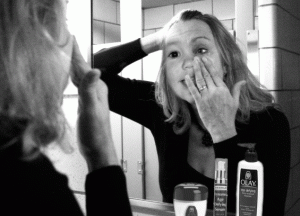By Cassandra Leveille
The age-defying trend has swept across America. Various creams and functional foods, such as acai berries and antioxidants, claim to help reduce wrinkles and fight the aging process. However, most consumer agencies report this is a placebo effect.
Still, Americans spent $44.6 billion on anti-aging products and services in 2004, according to a report from Business Communications Company, Inc., a Norwalk, Conn.-based research firm. Expenditures included $37.6 billion spent on drugs and supplements targeted at specific diseases of aging, $7.7 billion spent on appearance products and services and nearly $280 million spent on anti-aging products that use advanced technologies such as hair re-growth. According to BBC Research, in 2008, the global anti-aging market for the boomer generation was worth $162.2 billion.
Why so many Americans continue to buy into the anti-aging trend, even when most of the products have never been tested, may have something to do with our cultural values. American culture’s obsession with youth is inextricably tied with an ageist perspective.
Many products forge some legitimacy by tacking on a pseudoscience-y name. For example, Revlon currently markets an age-defying product called “Precise Wrinkle Eraser with Botafirm.” Olay offers an entire suite of age-defying products, with one brand, Olay Definity, boasting the “Essential Glucosamine Complex” on their Web site. However, these claims have rarely been tested, and if they are tested, it’s by the same cosmetics companies who sell the products. The recent health-conscious craze has also taken advantage of this angle, citing (or, at least, implying) longer life expectancies for those who purchase their products.
The use of age-defying products (and in some cases, expensive plastic surgeries) has also become career-savers in a society where current and future career prospects are everything. Both men and women are afraid to look older, assuming their employers will think they are no longer competent in performing their jobs and fire them. While ads targeted toward women are greatly disproportionate to ads targeted to men, it is a problem that affects both genders.
___________________________________
Cassandra Leveille is a junior writing major, and she don’t need no stinkin’ age-defying products. E-mail her at cleveil1@ithaca.edu.

